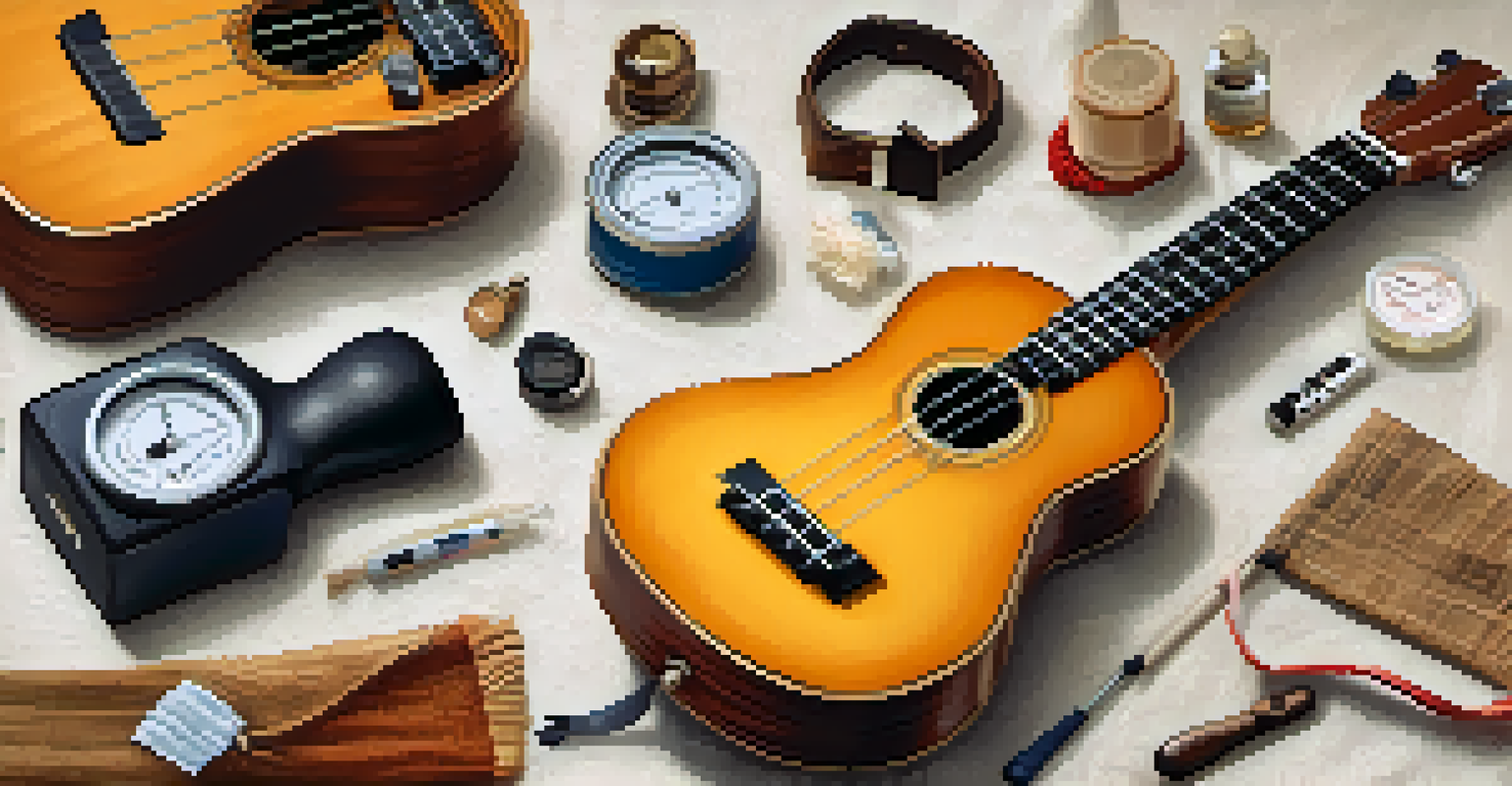Humidity Control for Your Ukulele: Best Practices Explained

Understanding the Importance of Humidity for Ukuleles
Humidity plays a crucial role in the health of your ukulele. It's important to remember that wood is a natural material that expands and contracts with changes in moisture content. When humidity levels are too low, the wood can dry out, leading to cracks and warping. Conversely, excessive humidity can cause the wood to swell, affecting the instrument's sound quality.
Wood is the most versatile and beautiful material on earth, and it needs to be treated with care and respect.
Most ukuleles thrive in a humidity range of 40% to 60%. This is the sweet spot that helps maintain the wood's integrity while also ensuring optimal sound performance. By monitoring humidity, you not only preserve your instrument's beauty but also extend its lifespan. After all, a well-cared-for ukulele can be a lifelong companion.
Understanding the relationship between humidity and your ukulele helps you make informed decisions about where and how to store it. With just a little awareness, you can avoid costly repairs and enjoy your music-making for years to come.
Signs Your Ukulele Is Suffering from Humidity Issues
Recognizing the signs of humidity-related problems is vital for any ukulele owner. If you notice cracks in the wood or the fretboard starting to separate from the neck, it’s a strong indicator that the humidity is either too low or too high. Additionally, a change in sound quality, such as a dull tone, can also point to humidity issues affecting your instrument's performance.

Another sign to watch for is the appearance of warping, particularly around the body and neck. If your ukulele looks or feels different than when you first got it, it might be time to check the humidity levels in your environment. Keeping an eye out for these changes can help you catch problems early on, saving you from more extensive repairs later.
Humidity Affects Ukulele Health
Maintaining humidity levels between 40% to 60% is essential to prevent wood damage and ensure optimal sound quality in your ukulele.
Being proactive about humidity can make a world of difference. Just like a musician fine-tunes their instrument, ensure you’re regularly inspecting your ukulele for any signs that it might be struggling with humidity.
How to Measure Humidity in Your Environment
Measuring humidity is easier than you might think. A hygrometer is a simple device that measures the moisture level in the air, giving you a clear idea of whether your environment is suitable for your ukulele. These can be found at music stores, home improvement shops, or online, and they come in various styles, from analog to digital.
Taking care of your instrument is like taking care of your voice; they both need to be nurtured to produce their best sound.
To get an accurate reading, place the hygrometer in the same room where you store your ukulele. Leave it there for a few hours or overnight to allow it to adjust to the environment. Once you have the reading, you'll know if you need to take action to protect your instrument from humidity fluctuations.
Regularly checking humidity levels helps you stay on top of any changes in your environment. This small investment in equipment can lead to significant long-term benefits for your ukulele's health.
Best Ways to Control Humidity for Your Ukulele
There are several effective methods for controlling humidity, ensuring your ukulele stays in tip-top shape. One popular option is using a humidifier, which adds moisture to the air when levels drop too low. You can use a room humidifier or a smaller, portable unit specifically designed for your instrument's case.
On the flip side, if humidity levels are too high, a dehumidifier can help remove excess moisture from the air. These come in various sizes and can be a game-changer for environments that tend to get muggy. Maintaining the right balance is key to keeping your ukulele happy and healthy.
Recognize Humidity Issues Early
Look out for signs like cracks or changes in sound quality to catch humidity-related problems before they require costly repairs.
Additionally, consider using humidity control packs that can be placed inside the ukulele case. These packs help maintain consistent humidity levels without the need for constant monitoring. This is a hassle-free way to protect your instrument, especially if you travel frequently.
Storing Your Ukulele Properly to Manage Humidity
Proper storage is essential for maintaining optimal humidity levels for your ukulele. Always store your instrument in its case rather than leaving it out in the open. Cases provide a more stable environment and protect your ukulele from sudden changes in temperature and humidity.
If you live in a climate with significant humidity fluctuations, consider investing in a hard case with built-in humidity control features. These cases are designed to stabilize the internal environment and provide an extra layer of protection for your ukulele, ensuring it stays safe during extreme weather.
When not in use, avoid placing your ukulele near windows, heat sources, or air conditioning vents, as these can cause rapid changes in humidity. Instead, find a cool, dry place where your ukulele can rest comfortably.
Traveling with Your Ukulele: Humidity Considerations
Traveling with a ukulele adds another layer of complexity to humidity control. Airplanes, cars, and different climates can all affect your instrument, so it’s vital to plan ahead. If you're flying, consider using a hard-shell case to protect your ukulele from potential damage during transport.
When traveling to different climates, be mindful of how the humidity levels might change. If you're heading to a particularly dry or humid area, you might want to pack extra humidity control packs or a small portable humidifier. This way, you can adjust the environment for your ukulele upon arrival.
Traveling Demands Humidity Awareness
When traveling, use protective cases and humidity control packs to safeguard your ukulele from varying environmental conditions.
Taking these precautions ensures that your instrument remains in optimal condition, no matter where your travels take you. A little planning goes a long way in safeguarding your ukulele while you're on the move.
Maintaining Your Ukulele for Longevity
Regular maintenance is essential for ensuring your ukulele stands the test of time. In addition to humidity control, make sure to clean your instrument regularly. Wipe down the strings and body with a soft, dry cloth to remove any dirt and oils that can accumulate over time.
Check the tuning pegs and strings frequently to ensure everything is in optimal condition. If you notice any wear on the strings, consider replacing them to maintain sound quality. Keeping your ukulele in tune not only enhances your playing experience but also helps preserve the instrument's overall health.

Finally, consider scheduling regular check-ups with a professional luthier. They can provide insights into any potential issues and help you maintain your ukulele properly. A little attention goes a long way in keeping your instrument sounding great for years to come.